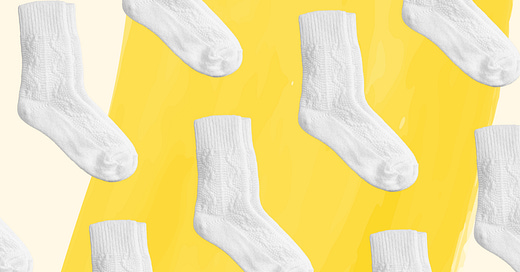Issue #45: For every single woman who’s ever been told she’s the problem
'It’s not you, it’s Generation Distraction – it’s the undefined situationships, the DM slides, the myriad dating apps that build their business models around disconnection.'
I’m in two minds about the term 'single’. On the one hand, it seems like an arbitrary marker of difference between those who have a constant romantic Someone, and those who don’t, in a way that often proves unnecessarily Othering. It can be problematic for those in relationships, too; because aren’t we all essentially singular, autonomous individuals, even when we’ve slept beside the same person for the past 30 years? Author Amy Key rejects the label entirely, on account of the independence she believes is precious to uphold, whether she’s in relationship or otherwise: ‘While I like and sometimes yearn for an ‘us’ state… I hope I will resist thinking of people as homogenised units rather than individual subjects,’ she explained in a recent interview with Another Magazine.
And yet, at this point in history, ‘single’ has never been so relevant a term. People are partnering up later in life (or not at all), or else becoming unexpectedly single at times of their lives when they expected to be otherwise; we all know the divorce statistics. Amid this period, we’re more in need than ever of single narratives, including those that have previously been underrepresented, such as later-in-life separations; widowhood; queer and non-binary experiences. That was the mission of journalist Angelica Malin – now a close friend – a couple of years ago when she got in touch asking me to contribute an essay to her Penguin anthology, Unattached: Empowering Essays on Singlehood. My essay was published alongside the likes of Vogue columnist Annie Lord, FT cultural critic Mia Levitin and The Single Supplement’s Nicola Slawson. As I say, we as a society need these stories – both in order to navigate our own lives, and to empathise with those around us.
In my essay, which I wrote in late summer 2021, I reflect on dating as a single woman in the 21st century, a theme I’ve gained so much first-hand experience in that I’m half-expecting my honorary doctorate any day soon. It’s not a topic I write about often; in part because you’ve got to maintain privacy in some areas of your life, even as a writer. Frankly, these days I’d rather regale you with 1,000 words on my sandwich choices (although, for beautifully-written reflections on dating, I will signpost to
Substack-er Tiffany Philippou and Millennial Love author/podcaster Olivia Petter).That said, I’m proud of what I wrote back then, not least because it got a shout out from
, arbiter of all good taste, in a review for The Guardian. Rereading the published essay the other day, I was reminded of how I felt when I wrote it: those feelings of being in the dating trenches; of romantic hopelessness in the face of app algorithms and unanswered messages; of feeling desperate to ‘find love’ with all the wrong people, in all the wrong places. The piece is framed as a pep talk to a hypothetical single best friend: one who is at rock bottom, and in need of what my actual best friend & I call a ‘hope carrier’. Also, as you may well guess, I wrote it for myself. It was what I needed then, and perhaps what you need now – if not for yourself then to support someone else navigating the less-than-fabulous side of ‘single life’ (which can, also, be exciting, and edifying, and self-affirming… but I’ll leave those stories for another day).And so, reproduced here with permission from Penguin, here is the essay in full:
For Every Single Woman Who’s Ever Been Told She’s the Problem – It’s Not You
For every single woman who’s ever been told she’s the problem, I see you, I hear you, I am you.
And I know that no matter how good the advice you give to your friends, no matter how clearly you can see their worth, their beauty, their kindness, their right to happiness – no matter how doggedly and sincerely you defend them at their lowest and most vulnerable – it’s infinitely harder to be that same friend to yourself.
I know every disappointing date, every rejection, every ‘Thing That Could Have Been a Thing’ not working out after a couple of months – oh, I know the sting, the sensation of sliding back down a snake when you hoped you’d landed on a ladder.
I know the dating-app filters you adjust after every run of bad luck, thinking, ‘Maybe I don’t care, maybe I don’t deserve this impossible Venn diagram of specifications, maybe attraction isn’t all that important, maybe the joke made in poor taste was a defence mechanism’ – in your lowest moments, whitewashing the reddest of flags to a more benevolent shade of pink.
And every time you say no to that second date with Mr Not Quite Right you feel that little bit less sure of yourself, less sure of your decision-making faculties, with echoes of relatives and friends in your head – she’s too picky, she’s been alone too long, she needs to learn to compromise.
I know the strange language you’ve learned, to navigate and normalise modern dating – ghosting, breadcrumbing, orbiting – the terms coined by lifestyle journalists and marketing gurus, cutesy vocabulary to justify the unjustifiable, the careless ways we drive each other crazy (because who knows the etiquette, really?).
I know the pain of a double blue tick, the evening vigil of an ‘Online’ status flickering on and off like a faulty light bulb, the slow erosion of hope over minutes, hours, days.
Keep reading with a 7-day free trial
Subscribe to The Shoulds by Francesca Specter to keep reading this post and get 7 days of free access to the full post archives.





